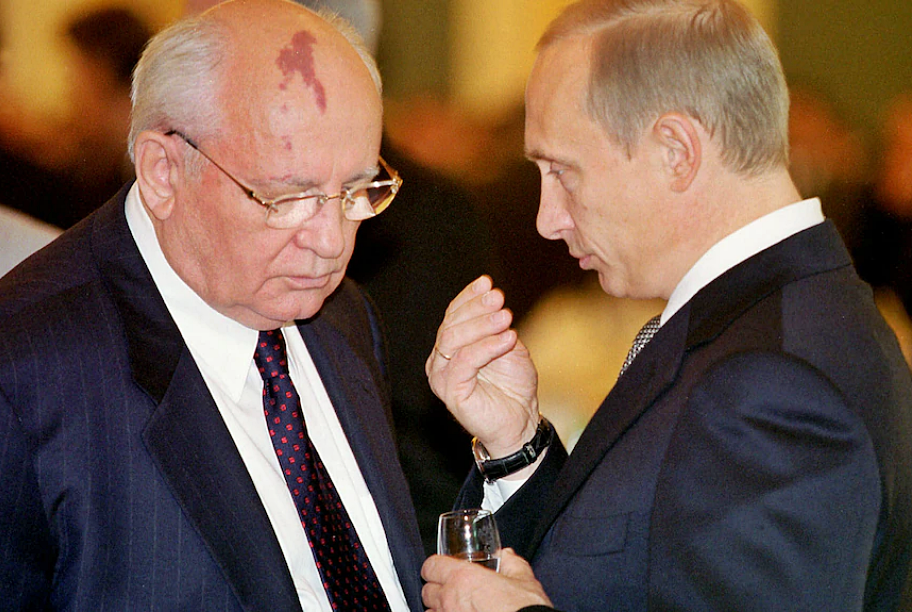Mikhail Gorbachev, the former Soviet leader who died last month at 91, was famous in the West for perestroika and glasnost. But three other Russian words also familiar in English were even more consequential for his reign and the resulting Soviet downfall: gaz, neft (oil), and atom. Gorbachev’s approach to these pillars of the Soviet economy continue to shape Russia’s relations with the world.
The most dramatic event of Gorbachev’s tenure, before the failed coup d’état that proved the coup de grâce for the Soviet Union, was the 1986 nuclear accident at Chernobyl. The cost of the cleanup was colossal, estimated at $68 billion in today’s money and involving some 500,000 people.Â
After the accident, plans to switch from oil and gas power to nuclear power were abandoned. Even more damaging, the Soviet system’s technical incompetence, dishonesty, and callousness were revealed to the world by theÂ
undeniable accusations of Geiger counters.
The rapid exploitation of the giant West Siberian oil fields kept the Soviet Union’s economy alive through the oil price boom of the 1970s but became its albatross during the late-1980s. Wasteful operational practices and a lack of modern technology led to over-hasty depletion, driving up production costs. Oil exports had risen solidly up to 1983 but then flattened out.
Petroleum was essential to feed energy-inefficient Soviet industries, subsidize its client states in Eastern Europe, and to earn foreign currency to buy technical goods and even wheat. Tensions grew between the Soviet Union and the other members of its economic sphere: they wanted cheap oil while Moscow preferred to sell to the West for dollars and Deutschmarks. Winters in Poland and Romania became cold and hungry.
American President Ronald Reagan has been credited in some quarters with driving down oil prices to undermine the Soviet economy. But while prices did crash in 1986, plummeting from $30 a barrel to $10, this alleged masterstroke was hatched in Riyadh, not Washington. Saudi Arabia had belatedly realized that its policy of cutting back production to defend prices was unsustainable in the face of “cheating” – overproduction by its OPEC colleagues – and rising non-OPEC output.
As Saudi Arabia flooded the market to drive out its competitors, American Vice President George H.W. Bush, a Texas oilman himself, traveled to Saudi Arabia to request restraint on production. He wanted higher prices to protect domestic drillers in the United States.
Bush’s efforts failed but the drop in oil revenues did fatally undermine the Soviet economy. As former Russian Prime Minister Yegor Gaidar explained, the Soviets couldn’t pay their bills or import food without Western credits, and those credits would be cut off if Gorbachev repressed the pro-democracy movements in Eastern Europe, as his predecessors Nikita Khrushchev and Leonid Brezhnev had done. This led speedily to the fall of the Berlin Wall, then to the disintegration of the Soviet Union itself.
But this is where gaz comes to the fore.
The USSR had first agreed to sell gas beyond the Iron Curtain in 1968, to Austria. The US repeatedly expressed worries about Europe’s growing reliance on Soviet gas, minor though its share was at first. Under Reagan in particular, as detente was replaced by confrontation, Washington applied sanctions and diplomatic and trade pressure to try to stop new Russian pipelines.
Under Gorbachev, who assumed power in 1985, gas exports to Western Europe grew dramatically – from 29 billion cubic meters in 1983 to 63 billion cubic meters in 1990 – even as the Soviet imperium crumbled. But this gas trade was not as one-sided as it would become during Russian President Vladimir Putin’s reign.
After 1991, Russia remained tied to Western Europe by pipelines. These crisscrossed newly independent states, notably Ukraine and Belarus, and were one of the few tools the weak Russia of the 1990s had to coerce former Soviet republics. A very different character from Gorbachev or his Kremlin inheritor Boris Yeltsin, Putin turned that tool into a weapon and extended it to Germany and other states beyond the former Iron Curtain.
Gazprom, successor of the Soviet Ministry of Gas, was rebuilt as the state champion. The Russian share of European gas consumption tripled, reaching 184 billion cubic meters in 2021. A chink in the armor became an Achilles’ heel.
Similarly, the pipeline monopoly, Transneft, and Rosneft, the vehicle of Putin ally Igor Sechin, made the petroleum oligarchs of the 1990s into exiles or tame servants of the Kremlin. Russia, rival and sometimes victim of OPEC throughout the 1980s and 1990s, became a partner with the launch of the OPEC+ alliance in 2016. Higher oil prices helped Russia build a war chest, which prevented the West from wielding loans against it.
Russia’s energy reach extends even further afield through Rosatom, the state’s nuclear energy corporation. Today it offers technically-superior solutions to the RMBK reactor that exploded at Chernobyl. In fact, Rosatom has been one of a small group of leading exporters of civil nuclear power, building plants at Bushehr in Iran, Akkuyu in Turkey, and El Dabaa in Egypt, to name a few. Russia is also an important exporter of nuclear fuel.
Rosatom has so far escaped sanctions levied by the West because of the war in Ukraine, but may face financing challenges as customers become wary of deepening their energy dependence on Russia. The Russian shelling around the Zaporizhzhia nuclear plant in Ukraine, and its disconnection from the grid, also carry the threat of another radioactive cloud drifting over Europe.
Gorbachev had only five years to solve intractable energy and economic problems, and he broke the state trying. If he had enjoyed Putin’s luck with rising oil prices, history might have been different. Instead, the Kremlin’s current occupant wields a brittle energy dominance that is based largely on a blueprint Gorbachev helped to write.
Syndication Bureau ________________
Robin M. Mills is CEO of Qamar Energy, and author of “The Myth of the Oil Crisis.”






